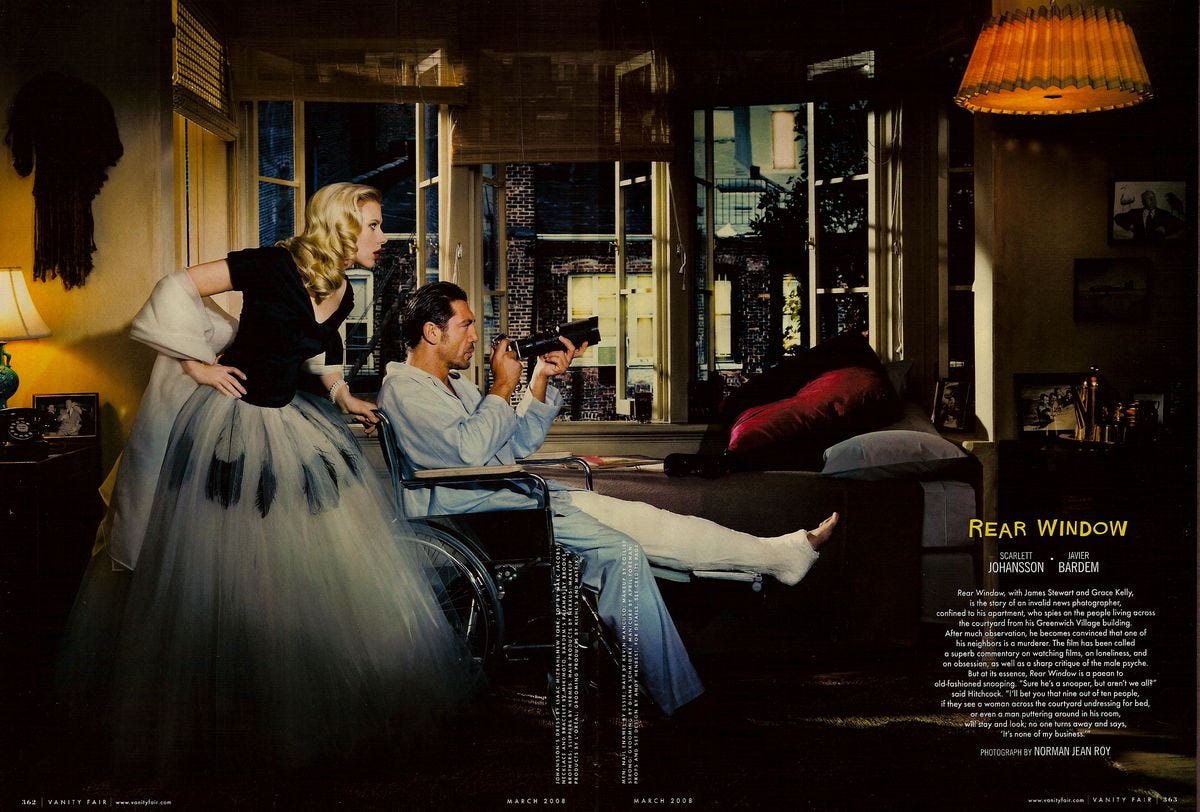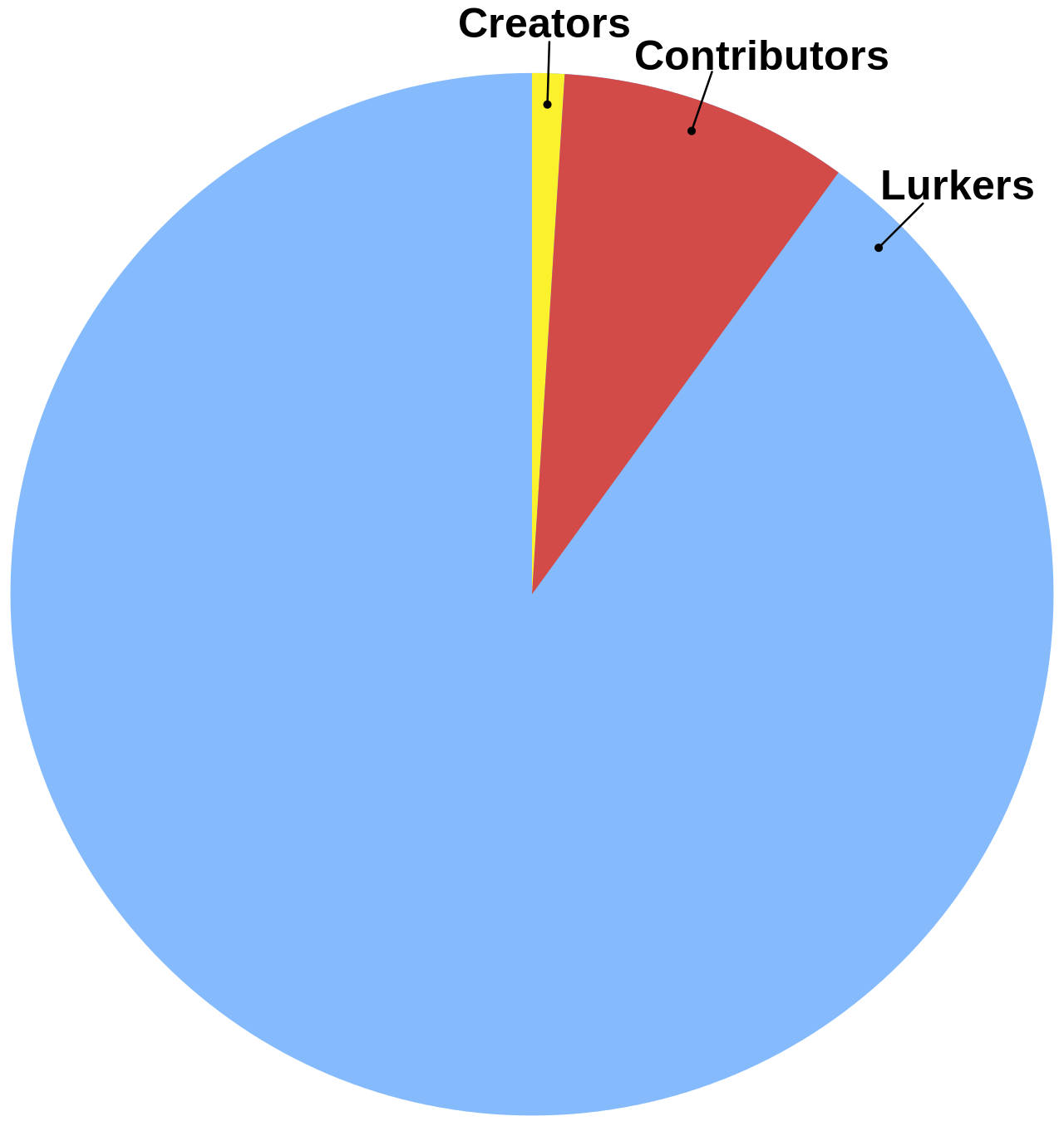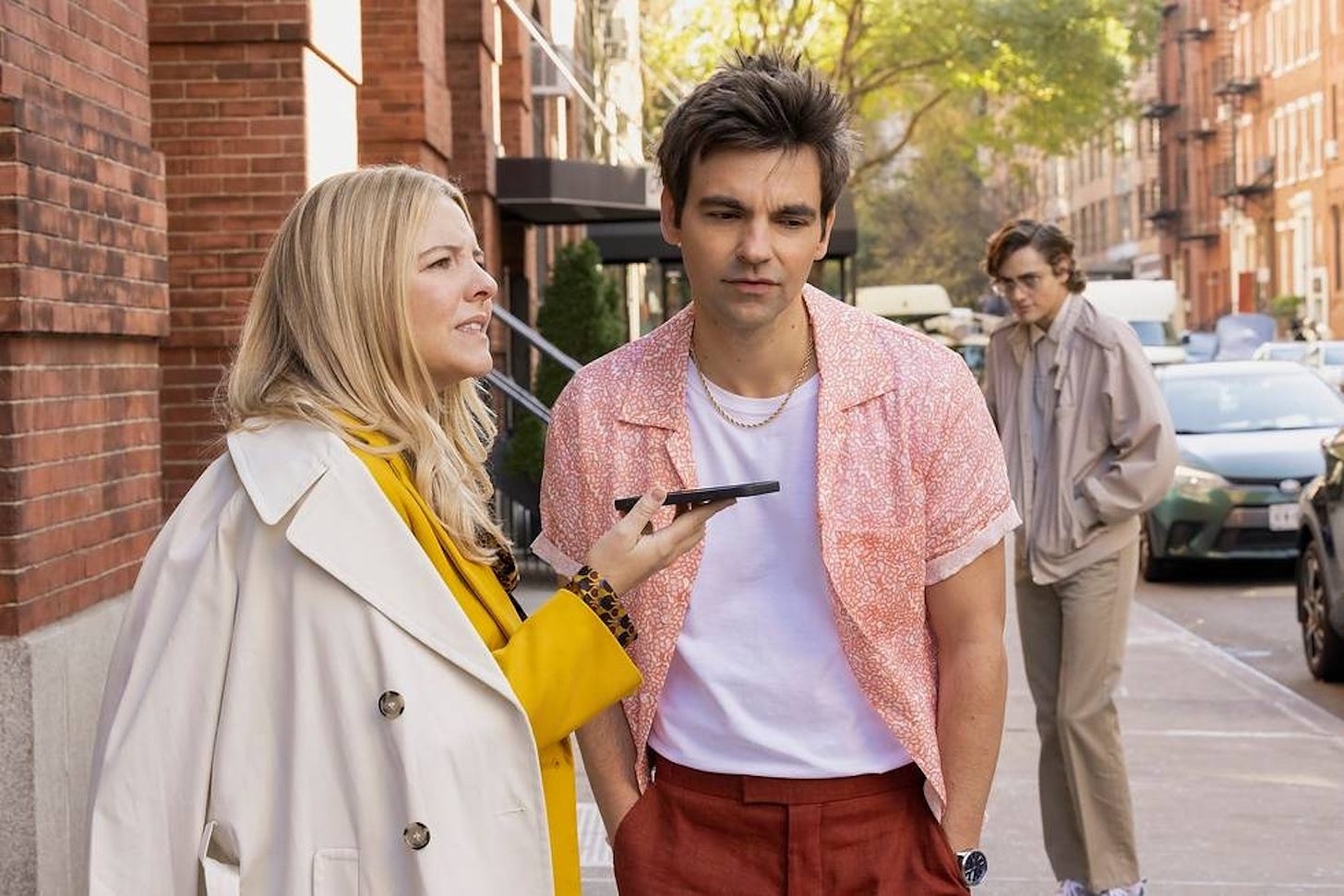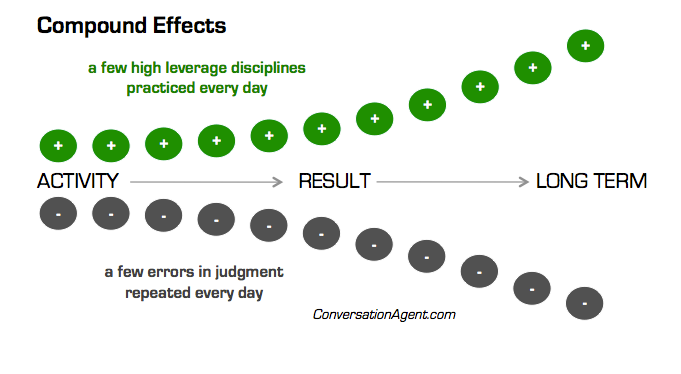A man in the semi-distance looks inside the apartment across and the yard below. From the activities taking place in view, he develops a narrative piecing together body language and action clues.
Third party observational narrative feels real to the moviegoer who becomes immersed in the sequence of events ‘as seen or described’ by someone else. Hitchcock’s 1954 Rear Window was way ahead in describing the view behind a lens.
We’ve always been fascinated by the lives of others.
On Value in Culture is a reader-supported guide to framing in narrative, language, books, value & culture. Both free and paid subscriptions are available. If you want to support my work, the best way is by paid subscription.

Social media and search engines took advantage of the social mechanism―unrolling a welcome mat to ‘the age of expressing ideas freely,’ of ‘being our own agents.’ They then turned around to either sell, take, or otherwise exploit data collected on us, and our customers.
Big tech companies Google, Facebook, Amazon, and Apple―The Four―capture commercial value based on who we are. Social media has also fed a certain version of the dissociation and detachment from reality that’s long been the most known side effect of fame.
We’re supporting actors in the phenomenon. Scholar Sharon Marcus argues The Drama of Celebrity (as we know it) is a cultural phenomenon with three distinct authors, who act in concert to create the special effect:
the celebrity―who expresses and shares art or the product they make
the journalists―who write about, photograph, criticize and otherwise contribute to building the celebrity’s public image
the public―who contribute devotion, imagination, money, love, and hate
HBO’s “The Other Two” gives us front seats on the phenomenon. The show is about loneliness and grief, social media toxicity, and the emptiness of fame. Some say Chris Kelly and Sarah Schneider’s creation is genius.
In its third season, Brooke’s narrative arc revolves around the character’s ambivalence about celebrity and the pressure of pandemic-era social-media virtue signaling. You know, the pandemic’s ‘doing-good’ joining the working hard and posting about it.
But before we try and dissect this part of our increasingly public social life, I want to turn to a discipline that is also in the business of broadcasting and consuming information ― biology.
There we learn that deception and self-deception have played a critical role in evolution. The very structure of our minds has been shaped from our earliest beginnings by the need to deceive.
We cannot help our nature
David Livingstone Smith explains Why we Lie. As our evolutionary ancestors began to gather in larger and larger groups, the increasing complexity of group dynamics led to an “arms race between deception and detection [that had] huge implications for the evolution of human intelligence.”
Language upset the balance between deception and detection, giving enormous advantage to the liar.
Plus, “most of us are embarrassingly inept at spotting liars.” We tend to privilege speech (mostly by text now) over raw observation, and miss the clues that give the liar away. Livingstone Smith:
“Once our ancestors learned to gossip, they could form secret alliances, deceive each other far more effectively about where they stood in relation to other community members, and stab each other in the back.
[...]
the power to deceive is our main weapon in the struggle for social survival.”
Ah, those physical stabbings! Self-deception was the adaptation. Because the best way to deceive another person is to deceive oneself.
“Self-deception has been a wonderful gift, but it is now destroying us. Our taste for it resembles our craving for sugar and animal fat.
[...]
the most dangerous forms of self-deception are the collective ones. Patriotism, moral crusades, and religious fervor across nations like plagues, slicing the world into good and evil, defender and aggressor, right and wrong.”
Wait, don’t tell me you recognize some of this!
Insects and flowers lie to propagate and hide from predators. What makes us continue to lie once our chances for survival improved? Well, it’s complicated. Because, in modern society, lying is mixed in with gossip, rumors, and secrets.
British anthropologist and evolutionary psychologist Robin Dunbar says language evolved so that people could gossip and more effectively establish and defend social groups. A more efficient form of grooming for humans.
However, “a lie has no power whatsoever by its mere utterance.” Pamela Meyer is a certified fraud examiner. She says a lie’s power emerges when someone else agrees to believe it.
Behavioral economist Dan Ariely says dishonesty is not rational. In The (Honest) Truth About Dishonesty: How We Lie to Everyone—Especially Ourselves he says we all cheat a little, but not so much that it causes us to compromise our self-image or integrity.
Ariely calls the phenomenon, the ‘fudge factor.’ Two years before Harvard professor Francesca Gina, a student of dishonesty, was accused of falsifying data, the Duke professor was himself accused of data fraud and academic misconduct. How much fudging?
But not all is lost. There are things we can do to learn the truth:
is it an ethical or a non-ethical issue (for example, a business or an engineering decision)?
are there prejudices that are outside conscious awareness that may motivate behaviors?
are there informal or unwritten forces within the organization that encourage employees to ignore or minimize the ethical implications of a decision?
or do factors like isolation, uncertainty, and time pressure increase the likelihood of an unethical decision?
Whatever it taxes to contour the context.
But as it’s often the case when people are involved, the answers to falsification increase in nuance and variety. Economist Timur Kuran calls it the ‘preference falsification’ phenomenon.
We say one thing to our family, friends, and social groups, and favor another privately.
It’s also well known that we say one thing, and do another. Which is why in research, it is best to observe behavior—recording on video where possible—than to ask directly for preferences.
Economists base their models on what they call homo economicus, the bloodless and instantaneous calculator of costs and benefits. Which we know is a figment of our imagination thanks to the work of behavioral economist Richard Thaler.
Sociologists refer to homo sociologicus, a product of social stimuli. And psychologists base their models on the homo psychologicus, a person ruled by conscience. I’m not making this up!
Kuran combined these three theories. He explains why people often mask their opinions when they’re in a group. They have Private Truths, Public Lies. Kuran’s ‘intrinsic utility’ mirrors the concept we know as ‘intrinsic motivation’:
“Suppose I’m with a group of friends and several of them indicated their interest in going to see a particular movie. But I’m not interested in going to the movie. Perhaps I want stay home and read a book, or I’m interested in going to a ball game, or I’m interested in watching another movie — but I think I will, if I admit that or if I communicate that, I will disappoint them, I’ll hurt their feelings, I’ll be ridiculed. So I say, ‘Oh, I'd love to come along.’”
That is one example of preference falsification. Saying you’ll do something you’d rather not do. But saying one thing and secretly wanting to do or say another has consequences.
“You could fail to raise an objection even if you’re quite certain that 90 percent of the people feel exactly like you.
[...]
You might object because you’ve seen that people who have indicated that even that they have doubts have been crushed, have been punished, have been ridiculed. And you think that other people also understand that, and so they will not step out to defend you even if they secretly admire what you’re doing, unless they sense that a critical mass has formed.
You yourself might be willing to object and take some risks if 20 percent of a particular group of a particular community has expressed opposition, or is campaigning against the status quo, against some inefficiency — but you will not if other people have not gone first. You won’t take the first step. And others are doing exactly the same calculation, and so they’re refraining from moving.
The negative consequence is that a policy or regime that many people dislike, that perhaps the majority intensely dislike, survives out of fear.”
We all like to think we’re special and discerning, that out preferences are unique. And yet, it always takes someone else to signal that an article, a book, a product is good before we support it.

People may underestimate the number of others who agree with them, and also may not speak up because they fear they’ll be let holding the candle... nobody else will say a thing.
Stranded
A group of passengers who were left stranded from a previous flight due to technical glitches through security was waiting to board the next flight on standby. They had to wait until the very last second before doors closed to learn if they had a seat.
One of them confided how poorly the airline handled the whole situation, but he said it would take critical mass to send a clear message that it’s not okay to treat paying customers that way.
Not a peep from the two passengers stranded with him. Why make waves when they could lose their potential seat? Fear is a big motivator, in the negative. Monopolies create these kinds of situations.
Scarcity creates the conditions for resignation, if not acceptance. It doesn’t change the poor situation we’re in (especially as we talk airlines in America), but it explains it. There’s little transparency to ticket classifications and codes.
Lack of transparency shifts the burden of education on customers. Which is why the travel hacking industry will continue to thrive. Did you hear about that teenager who got banned by American Airlines for trying to use a money-saving hack?
“It’s not exactly a solid business practice to preemptively accuse your paying customers of fraud.” I once had an airline try to cancel my sister’s return flight after it mistakingly checked us both in in my name on the way over.
THEIR mistake! And we had proof (keep those boarding passes, people.)
Other situations create cognitive dissonance. For example, when you know someone’s preferences from a private conversation:
“You can be in an organization, in a department meeting and know that there are several of your colleagues who object to, let us say, the chairperson — something that the chairperson is doing. But that they are afraid to offend the chairperson. You will then falsify your preference, knowing that others are doing exactly the same.”
We can improve our culture
How do we change our mind about speaking up? There are several factors to consider:
new information is available—our preferences may change based on what we learn
a sense of the popularity of alternative positions, maybe something has become acceptable to talk about when it wasn't earlier—for example, now it is quite acceptable to object to predatory sexual practices in Hollywood
the act of preference falsification also creates discomfort, so we want to come clean (results may vary based on individuals and the type of falsification)
If a small group finds the courage to speak up because they have a thicker skin, or out of guilt for falsifying, then others may feel more comfortable speaking up. The lid is open, and out comes the truth.
It could also be a combination of things. Some people know more than others, or they've reached their limit of tolerance for a certain situation. You’ve had enough and nobody is going to stop you from telling.
But there’s a flip side, there always is. Which is the reason why new regimes can be so oppressive. When the wind of change blows in a different direction, the people who supported the former administration may pretend they didn’t like it all along.
New leaders know people play sides. So they crack down or try to draw them out. Fear makes for swift changes in alliances. So take care. Kuran:
“The people who had stood on the sidelines all along and had hoped that the demonstrations would not succeed, who had hoped that the status quo would persist, a point comes when they realize that a new world has been born, and that the sources of fear are different. Power has shifted. And they have to now, in self-defense, start falsifying their preferences in a different way.
To go back to an example from recent times, there must be people in Hollywood who were quite comfortable with the environment that existed, who perhaps had behaved like Weinstein and who were hoping that the public opinion would not shift. That Weinstein would prevail.
But at the moment, given that public opinion has shifted, they will not defend Weinstein. They will, in fact, argue that all along they've been quite disturbed by the predatory behavior of some people and by the tolerance shown to them, and that the only reason they had not said anything or they had not acted is because they were afraid of retaliation from people like Weinstein.”
Reality follows thought. Physicist David Bohm talks about the fragmentation of thought. Our social reality follows a similar fragmentation as our sources of information.
Kuran says the reason why people who self-select and identify with certain communities have a hard time mingling with others is the higher level of discomfort they may create by speaking up. It requires greater preference falsification.
Telling the truth hurts feelings. Truth is important to us, but we have a hard time telling what is true. Bohm:
“you have to watch out for the notion of truth. Dialogue may not be concerned directly with truth—it may arrive at truth, but it is concerned with meaning. If the meaning is incoherent you will never arrive at truth. You may think, ‘my meaning is coherent and somebody else's isn’t,’ but then we'll never have meaning shared. You will have the ‘truth’ for yourself and for your own group, whatever consolation that is. But we will continue to have conflict.”
Would we be better off if we eliminated all preference falsifications? Or do we think that some forms of small falsifications, like someone’s taste in fashion would serve a good purpose?
At this point the conversation shifts to public policy and the value of putting cards on the table. Ray Dalio, founder of successful investment firm Bridgewater Associates, talks about the value of ‘radical truth’ and ‘radical transparency.’
In Principles, he says that life, management, economics, and investing can all be systematized into rules and understood like machines. Dalio believes in idea meritocracy. Striving is part of our lives and society. Dalio:
“I believe that pursuing self-interest in harmony with the laws of the universe and contributing to evolution is universally rewarded, and what I call ‘good.’ Look at all species in action: they are constantly pursuing their own interests and helping evolution in a symbiotic way, with most of them not even knowing that their self-serving behaviors are contributing to evolution.
[...]
Self-interest and society’s interests are generally symbiotic: more than anything else, it is pursuit of self-interest that motivates people to push themselves to do the difficult things that benefit them and that contribute to society. In return, society rewards those who give it what it wants.”
(Can self-interest go hand-in-hand with caring for others?)
We can test Kuran’s ‘preference falsification’ by looking at inconsistencies, timelines, private vs. public statements. This is especially important when a change is coming. Knowledge of how incentives and rewards are doled out helps, too. Kuran:
“We just have to start anticipating the need for this type of information. We have to design our surveys accordingly and start collecting data in various ways under various conditions to be able to identify what exactly is driving changes in public preferences.”
We must be smarter about how we collect and read the emotional data in surveys. And as we developed applications, the Internet started magnifying consequences by the speed and acceleration at which opinion travels.
Nothing you share online is private, direct messaging and groups included. Privacy on social media is an illusion buoyed by lack of immediate consequences and the perception that you’re alone behind the screen.
Cautious people separate private from public persona.
“Falsehood flies, and truth comes limping after it, so that when men come to be undeceived, it is too late; the jest is over, and the tale hath had its effect: like a man, who hath thought of a good repartee when the discourse is changed, or the company parted; or like a physician, who hath found out an infallible medicine, after the patient is dead.”
- Jonathan Swift
Kuran’s Private Truths, Public Lie was published in 1997. Economist (Nobel Prize in Economic Science, 2005) and professor Thomas Schelling had already generalized the phenomenon in 1978 with Micromotives and Macrobehavior.
If Kuran were writing the book today, he says he would “put more emphasis on the interactions between the informational drivers of preference falsification and the reputational drivers, as well as the effects.”
In shows like “The Other Two” as in social media and celebrity culture, the main question is one of identity. There’s the version of you performed for the public. There’s the version others create of you against their own image. And there’s the real you—the one everyone struggles to find and express truthfully.
To reconcile the three in the context of culture we need shared values and a commitment to certain skills. I found the definition and signs of good faith communication helpful:
Expressions of humility and curiosity
Openings for changes in position based on new information
Disagreements welcomed; group learning valued
Steelmanning the position of others
Respect maintained during disagreement
Sufficient time given to open discussion and other aspects of fair process
Use of careful clarifications and evidence
Attempts at finding shared base realities and values
Emergence of new positions, integrations, and nuance
Note: All signs can be ‘faked’ in bad faith. (Check out the Consilience Project if you’re banging your head against the wall trying to understand what’s happening to society.)
Books I mentioned in the article:
Private Truths, Public Lie, Timur Kuran
The Four, Scott Galloway
The Drama of Celebrity, Sharon Marcus
Why we Lie, David Livingstone Smith
Grooming, Gossip and the Evolution of Language, Robin Dunbar
The (Honest) Truth About Dishonesty: How We Lie to Everyone—Especially Ourselves, Dan Ariely
On Dialogue, David Bohm
Principles, Ray Dalio
Micromotives and Macrobehavior, Thomas Schelling







